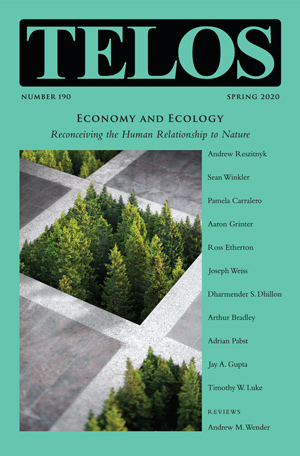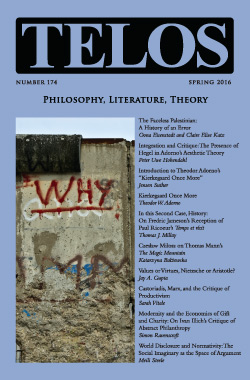In today’s episode of the Telos Press Podcast, David Pan talks with Lillian Hingley about her article “The Feminine Character: The Allegory of Ibsen’s Women in Adorno’s Modernist Literary Theory” from Telos 196 (Fall 2021). An excerpt of the article appears here. In their conversation they talked about Adorno’s idea of the “feminine character” and how it relates to his broader critique of capitalist society; Adorno’s reasons for focusing on the women of Ibsen’s plays; the ways that Adorno uses the idea of allegory to interpret Ibsen’s work; how Adorno links individual tragedy to more general structures of alienation; and whether Adorno is trying imagine a world without tragedy or, alternatively, if tragedy for Adorno is just a part of human existence. If your university has an online subscription to Telos, you can read the full article at the Telos Online website. For non-subscribers, learn how your university can begin a subscription to Telos at our library recommendation page. Print copies of Telos 196 are available for purchase in our online store.
|
Ross Etherton’s “Reading against the Gun: The Machine Gun and Sturm” appears in Telos 190 (Spring 2020): Economy and Ecology: Reconceiving the Human Relationship to Nature. Read the full article at the Telos Online website, or purchase a print copy of the issue in our online store. Individual subscriptions to Telos are available in both print and online formats. Ernst Jünger’s Sturm, published in English translation by Telos Press, is also available in our store. In the April 12, 2018, issue of Art Journal, the editor, Rebecca Brown, introduces a work of art (really, a computer program), called CitationBomb by Zach Kailer, intended to create a kind of “denial of service” attack on Google Scholar: “The more users do this, the more Google Scholar will become overflowed with citations. This will make it difficult for the algorithms to make sense of influence or impact.” The overall point is to “devalue scholarly metrics” as they represent in small the horrors of the neoliberal university. As Brown puts it, “what numerical value applies to achieving the arc of a compelling paragraph? [It makes] manifest the un-usefulness of analytics . . . its profound, destructive force.” Why are “analytics” so destructive? Kaiser explains that Google Scholar incentives “clickbait scholarship.” Meaning, since Google Scholar puts first the books or articles that get the most citations, this leads to a “winner take all” situation with scholarship. Only the articles that are cited often get cited at all, leaving all the other scholars in the dust. Those who read Hamlet or Hecuba from the specialist’s standpoint have often found it naïve, and maybe with good reason. Yet I do not want to linger on its worth or faults as a critical essay; I would rather try to read Schmitt’s book in the same way that he read Hamlet, as an eccentric writing, not completely closed, that deals with a subject matter but revolves around another one: Hamlet or Hecuba is something more than a piece of literary criticism. This article presents the connections between the Polish poet Czesław Miłosz and Thomas Mann’s The Magic Mountain. Miłosz’s fascination with the German novel, which has its roots in the 1930s, changed profoundly over the decades. Not only did the poet ponder on the immense intellectual value of The Magic Mountain, but he also turned to it eagerly as a form of literary “substance” and inspiration for his own works (The Seizure of Power, A Magic Mountain). The novel left deep marks on the author of The Captive Mind, because throughout his whole life he sought references to his own life in the fictitious events and characters from Mann’s story. The chosen fragments of texts and conversations with the Polish poet enable us to investigate the history of the extraordinary connection between Miłosz and this twentieth-century epic masterpiece, indicating at the same time the key moments of this “literary relationship.” Telos 174 (Spring 2016): Philosophy, Literature, Theory is now available for purchase in our store. |
||||
|
Telos Press Publishing · PO Box 811 · Candor, NY 13743 · Phone: 212-228-6479 Privacy Policy · Data Protection Copyright © 2025 Telos Press Publishing · All Rights Reserved |
||||




